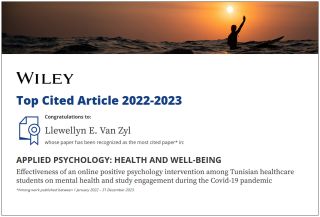Happiness
The Happy-Productive Worker Hypothesis: Factor or Fallacy?
Navigating the complexities of happiness and productivity
Posted April 24, 2024 Reviewed by Davia Sills
Key points
- The "happy-productive worker" hypothesis is a fallacy which suggests that happy people are more productive.
- Research found contradictory evidence that challenges the notion of a direct, reciprocal relationship.
- Individual, organizational, and contextual factors significantly moderate how happiness impacts productivity.
- The relationship between happiness and performance is not always bidirectional.

Yesterday, my colleagues and I received the Top Cited Paper Award (2022-2023) for our paper on a positive psychological intervention we implemented for healthcare students. I was also informed that two of my papers in the Journal of Positive Psychology (the highest-ranked journal in positive psychology) were in the top three most-read and most-discussed manuscripts in the journal for the 2023 publication cycle. On top of this, I published around 29 papers (and had about 33 others in review somewhere). These are such wonderful accolades and provide some recognition for the great work which my team and I did. Undoubtedly, the 2022-2023 academic year has been the most productive and successful period in my entire academic career.
However, despite these achievements and my high performance, I found myself to be deeply unhappy. This seeming contradiction—having attained such remarkable success while grappling with profound personal dissatisfaction—has led me to ponder a fundamental question: Why was I able to function at such a high level yet feel tremendously unhappy at the same time? And more importantly, why did this high level of performance fail to translate into happiness?
These questions strike at the heart of the “happy-productive worker” hypothesis—an idea that has become one of the building blocks of positive psychology and organizational psychology. The core premise of this idea is that there exists a symbiotic, reciprocal relationship between an employee’s level of happiness and their work performance.
So why was this not the case for me? This seeming contradiction, having achieved some remarkable academic success while feeling deeply unhappy, provides a compelling case study to look into what the research actually says about this “happy-productive worker” hypothesis.
What Is the Happy-Productive Worker Hypothesis?
The idea that happier workers are more productive and that increased productivity leads to greater happiness has become a cornerstone of not only my discipline but also one of the main drivers in practice. The idea was popularized by Frank Landy (1985), who argued that there is a symbiotic, reciprocal relationship between employees’ level of happiness and their work performance. And it is an intuitively appealing concept that resonates with many managers and HR professionals.
The underlying logic seems sound—when employees feel content and fulfilled, they are more likely to engage enthusiastically in their work, exhibit creativity, and maintain high levels of motivation and resilience, all of which contribute to enhanced performance. And when these employees experience the positive outcomes associated with their increased productivity, such as recognition, advancement opportunities, and a sense of accomplishment, their overall happiness and job satisfaction are further bolstered.

Factors Moderating the Happiness-Performance Relationship
But if the happy-productive worker hypothesis is correct, then why does there seem to be an inverse relationship between my happiness and my productivity? It would seem that the unhappier I became, the better I performed, and the better I performed, the unhappier I got. Am I just an outlier—a statistical anomaly?
Well, not entirely! Although the idea is appealing, the empirical evidence supporting the claim has been mixed and even contradictory at times. Recent studies have revealed that the relationship between happiness and job performance is far more complex and nuanced than the simplistic, deterministic view often presented. As with many psychological phenomena, the relationship between happiness and job performance is likely moderated by various individual, organizational, and contextual factors.
- On an individual level, factors like personality traits, personal life circumstances, job fit, and emotional self-regulation abilities can moderate how an employee’s experienced happiness connects to their work behaviors and performance. For example, highly conscientious individuals may find satisfaction in efficiently completing tasks, leading to higher productivity, while those with lower emotional stability may struggle to maintain happiness in stressful work environments.
- Organizational factors such as culture, policies, and management practices also play a critical role in shaping employee happiness and job performance. A supportive and inclusive work environment that values employee well-being can contribute to higher levels of happiness, while factors like excessive workload, lack of autonomy, and poor management can undermine employee morale and lead to decreased happiness and performance.
- Contextual factors like industry norms, economic conditions, and societal expectations can shape the relationship between happiness and job performance. In highly competitive or high-pressure industries, employees may feel compelled to prioritize productivity over their own well-being, leading to a potential mismatch between happiness and performance. Macroeconomic factors such as job insecurity and industry disruptions can also impact employees’ perceptions of their jobs and future prospects, influencing their happiness levels and performance outcomes.
Interestingly, research also shows that the relationship between happiness and performance is not always bidirectional. While happy employees may indeed be more productive in certain contexts, there are instances where heightened productivity may lead to burnout and even detract from overall well-being. Finally, the complexity of human motivation suggests that productivity can stem from various sources beyond happiness alone, including extrinsic incentives, intrinsic interest in the work itself, and a sense of duty or responsibility. Therefore, while fostering employee happiness is undoubtedly valuable for organizational success, the direct reciprocal link proposed by the happy-performing worker thesis may oversimplify the multifaceted nature of workplace dynamics.
Conclusion
So what does this all mean for you and me? Well, the realization that my academic performance has come at the cost of my personal well-being has been both humbling and enlightening. While the “happy-productive worker” hypothesis may hold true in certain contexts, my own experience and the latest research serve as a powerful testament to the complexities and nuances that underlie the relationship between happiness and performance. By understanding that various factors affect our happiness and performance, we can chart a path toward creating more sustainable practices that can generate perpetual energy!
References
Gutiérrez, Oscar Iván, Jean David Polo, Milton José Zambrano, and Diana Carolina Molina. "Meta-analysis and scientific mapping of well-being and job performance." The Spanish Journal of Psychology 23 (2020): e43.
Pérez-Nebra, A. R., Ayala, Y., Tordera, N., Peiró, J. M., & Queiroga, F. (2021). The relationship between performance and well-being at work: a systematic review of 20 years and future perspectives in Brazil. Revista Psicologia Organizações e Trabalho, 21(2), 1535-1544.
Sender, G., Nobre, G. C., Armagan, S., & Fleck, D. (2022). In search of the Holy Grail: A 20-year systematic review of the happy-productive worker thesis. International Journal of Organizational Analysis, 29(5), 1199-1224.
Ayala, Y., Peiró Silla, J. M., Tordera, N., Lorente, L., & Yeves, J. (2017). Job satisfaction and innovative performance in young Spanish employees: Testing new patterns in the happy-productive worker thesis—A discriminant study. Journal of Happiness Studies: An Interdisciplinary Forum on Subjective Well-Being, 18(5), 1377–1401. https://doi.org/10.1007/s10902-016-9778-1
Landy, F. J. (1985). Psychology of Work Behavior. Dorsey Press.





